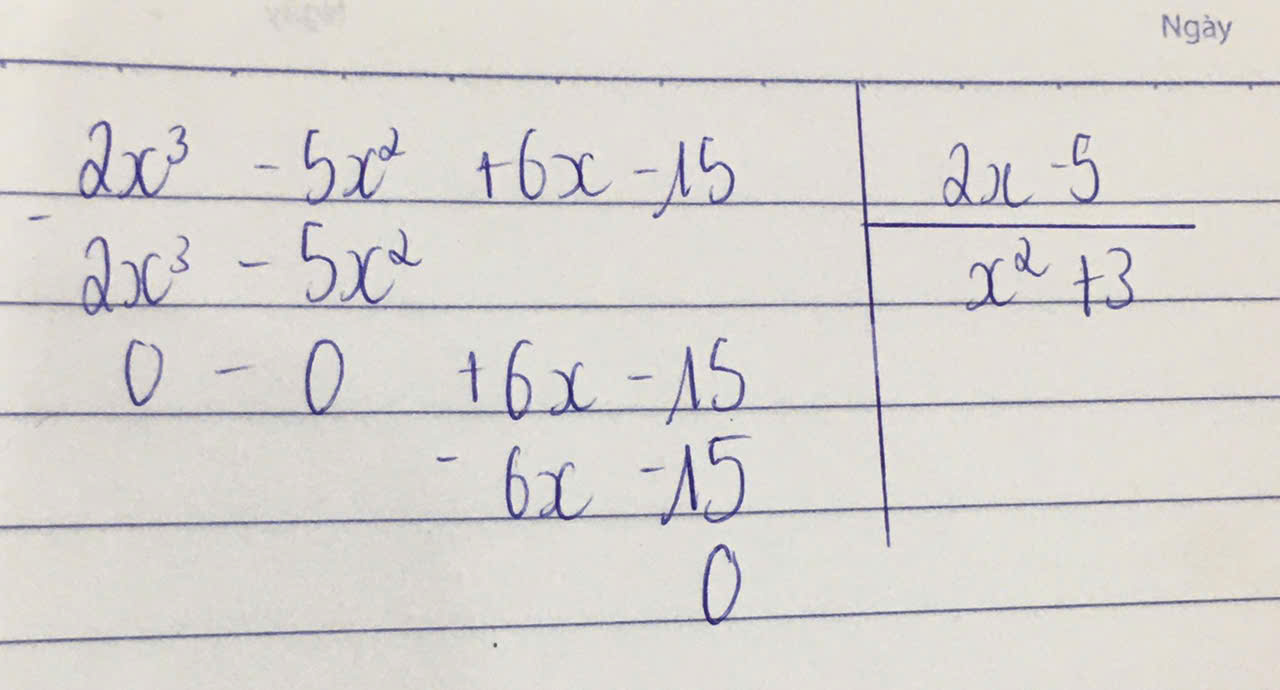Hãy nhập câu hỏi của bạn vào đây, nếu là tài khoản VIP, bạn sẽ được ưu tiên trả lời.

a,(\(6x-5x^2-15+2x^3:\left(2x-5\right)\)
\(\left(2x^3-5x^2+6x-15\right):\left(2x-5\right)\)


1: \(D=x^2+x+\dfrac{1}{4}+\dfrac{3}{4}=\left(x+\dfrac{1}{2}\right)^2+\dfrac{3}{4}>0\)
6: \(F=2\left(x^2+2x+\dfrac{3}{2}\right)=2\left(x^2+2x+1+\dfrac{1}{2}\right)\)
\(=2\left(x+1\right)^2+1>0\)
7: \(=3\left(x^2-\dfrac{5}{3}x+1\right)\)
\(=3\left(x^2-2\cdot x\cdot\dfrac{5}{6}+\dfrac{25}{36}+\dfrac{11}{36}\right)\)
\(=3\left(x-\dfrac{5}{6}\right)^2+\dfrac{11}{12}>0\)
8: \(=4x^2+4x+1+1=\left(2x+1\right)^2+1>0\)

\(4)D=x^2+x+1\)
\(D=x^2+2x.\frac{1}{2}+\left(\frac{1}{2}\right)^2-\left(\frac{1}{2}\right)^2+1\)
\(D=\left(x+\frac{1}{2}\right)^2-\frac{1}{4}+1\)
\(D=\left(x+\frac{1}{2}\right)^2+\frac{3}{4}\)
Vậy biểu thức trên luôn nhận giá trị dương với mọi giá trị của x.
Các câu khác lm tương tự nhé.
Cho góp ý xíu: lần sau bn đưa từng câu một lên diễn đàn thì sẽ có câu trả lời nhanh hơn là đưa cùng một lúc như thế này đấy
hok tốt~
\(D=x^2+x+1=x^2+x+\frac{1}{4}+\frac{3}{4}=\left(x+\frac{1}{2}\right)^2+\frac{3}{4}\)
\(\left(x+\frac{1}{2}\right)^2\ge0\forall x\Rightarrow\left(x+\frac{1}{2}\right)^2+\frac{3}{4}\ge\frac{3}{4}>0\forall x\)( đpcm )
\(F=2x^2+4x+3=2\left(x^2+2x+1\right)+1=2\left(x+1\right)^2+1\)
\(2\left(x+1\right)^2\ge0\forall x\Rightarrow2\left(x+1\right)^2+1\ge1>0\forall x\)( đpcm )
\(G=3x^2-5x+3=3\left(x^2-\frac{5}{3}x+\frac{25}{36}\right)+\frac{11}{12}=3\left(x-\frac{5}{6}\right)^2+\frac{11}{12}\)
\(3\left(x-\frac{5}{6}\right)^2\ge0\forall x\Rightarrow3\left(x-\frac{5}{6}\right)^2+\frac{11}{12}\ge\frac{11}{12}>0\forall x\)( đpcm )
\(H=4x^2+4x+2=4\left(x^2+x+\frac{1}{4}\right)+1=4\left(x+\frac{1}{2}\right)^2+1\)
\(4\left(x+\frac{1}{2}\right)^2\ge0\forall x\Rightarrow4\left(x+\frac{1}{2}\right)^2+1\ge1>0\forall x\)( đpcm )
\(K=4x^2+3x+2=4\left(x^2+\frac{3}{4}x+\frac{9}{64}\right)+\frac{23}{16}=4\left(x+\frac{3}{8}\right)^2+\frac{23}{16}\)
\(4\left(x+\frac{3}{8}\right)^2\ge0\forall x\Rightarrow4\left(x+\frac{3}{8}\right)^2+\frac{23}{16}\ge\frac{23}{16}>0\forall x\)( đpcm )
\(L=2x^2+3x+4=2\left(x^2+\frac{3}{2}x+\frac{9}{16}\right)+\frac{23}{8}=2\left(x+\frac{3}{4}\right)^2+\frac{23}{8}\)
\(2\left(x+\frac{3}{4}\right)^2\ge0\forall x\Rightarrow2\left(x+\frac{3}{4}\right)^2+\frac{23}{8}\ge\frac{23}{8}>0\forall x\)( đpcm )

a) \(2^3:\left|x-2\right|=2\)
\(\Leftrightarrow8:\left|x-2\right|=2\)
\(\Leftrightarrow\left|x-2\right|=8:2\)
\(\Leftrightarrow\left|x-2\right|=4\)
Xét trường hợp 1: \(x-2=4\)
\(\Rightarrow x=4+2\)
\(\Rightarrow x=6\)
Xét trường hợp 2: \(x-2=-4\)
\(\Rightarrow x=-4+2\)
\(\Rightarrow x=-\left(4-2\right)\)
\(\Rightarrow x=-2\)
Vậy \(x=6\) hoặc \(x=-2\)
b)

3^x*5^x-1=224
3^x*5^x/5=224
15^x=224*5
15^x=1120
=>ko tồn tại x thỏa mãn đề bài vị 15^x luôn có tận cùng bằng 5 (x khác 0 ) hoặc 1 ( x=0) ma 1120 co tận cùng bằng 0

a, x=-505
b, x=35/8 hoac -37/8
nhung cau con lai thi tong tu
b) (5/2-3x)=25/9
3x = 5/2-25/9
3x =-5/18
x =-5/18:3
x=-5/54
\(e.\left(x-1\right)^5=-32\)
\(\left(x-1\right)^5=\left(-2\right)^5\)
\(x-1=-2\)
\(x\) \(=-2+1\)
\(x\) \(=-1\)
Vậy \(x=-1\)